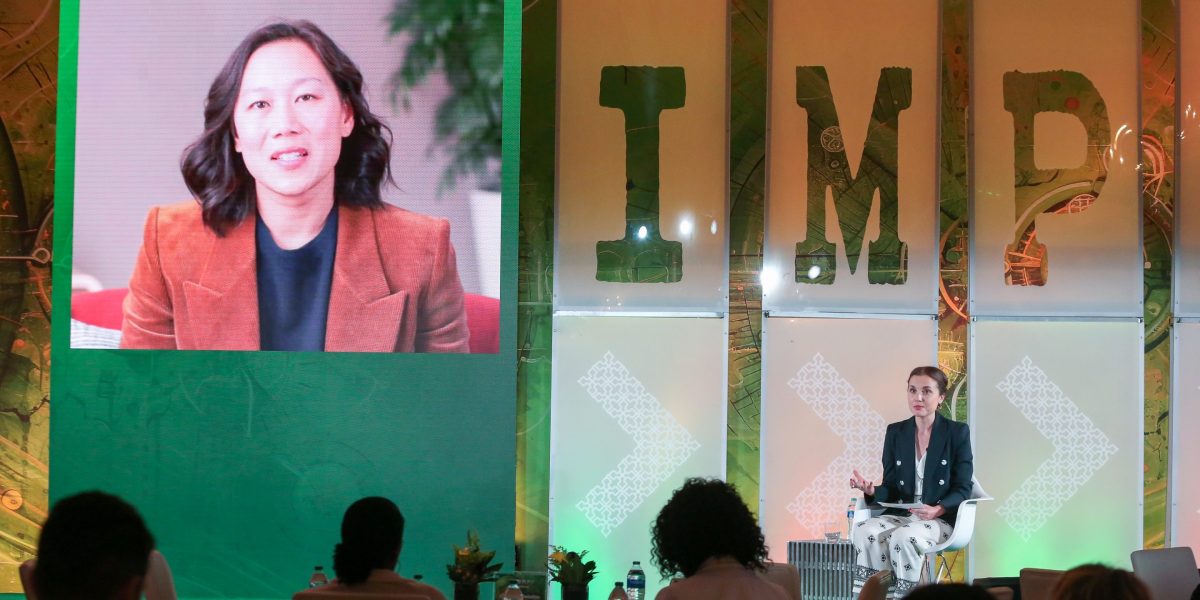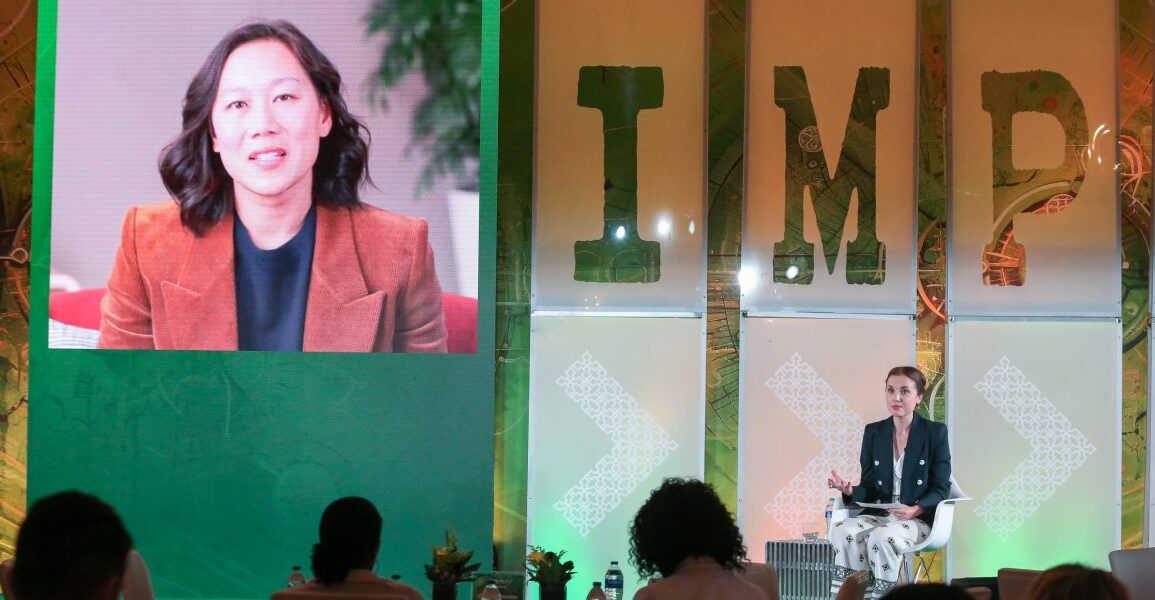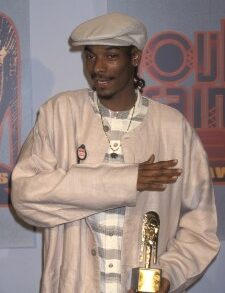
Good morning, Broadsheet readers! GM CEO Mary Barra is frustrated by the UAW strike, the first Black female billionaire is staging her “third act,” and Ellie Austin, deputy editorial director of Fortune Live Media, interviews Dr. Priscilla Chan about how she’s building her legacy. Have a meaningful Monday!
– Leaving a legacy. Dr. Priscilla Chan and her husband Meta CEO Mark Zuckerberg founded the Chan Zuckerberg Initiative in 2015 with one particularly lofty goal in mind: to cure, prevent, or manage all disease by the end of the century.
In their bid to achieve this, they have pledged $6.4 billion to science. (The couple plan to give away 99% of their Meta stock over the course of their lifetimes.) Their specific focus is on funding and carrying out pioneering biomedical research, as well as the creation of open-source tools that allow scientists to work more efficiently.
It’s through this work that smaller, supplementary goals have emerged. One is improving the participation of underrepresented groups in science research. An FDA report published last year shows that in 2020 75% of participants in clinical trials for 53 new drugs were white. Chan wants to spotlight another underrepresented group: children.
“In biomedical research, the majority of our knowledge, our data that comes out of labs, is based on adults of European ancestry,” Chan, a pediatrician as well as the cofounder and co-CEO of the CZI, told me at the Fortune Impact Initiative conference in Atlanta last week. The interview was her first after returning to work following the birth of her and Zuckerberg’s third daughter.
“Racial diversity is just one form of diversity,” she said, noting that the CZI has donated $46 million to America’s four Historically Black Medical Colleges to advance inclusion in medical research. “Another that’s very near and dear to my heart as a pediatrician is making sure that we don’t forget kids. Right now, a lot of research doesn’t represent kids and doesn’t tell us about their development and what should be happening as they grow up.”
To redress the balance, the CZI has been “really intentional about seeding research that…brings in children so that we have information across the spectrum of race and age as we move forward in this really exciting era of science,” she said.
Another minority group that the organization works closely with is sufferers of rare diseases. (The National Institutes of Health define a rare disease as one that affects fewer than 200,000 people in the United States.) The journey to diagnosis for rare disease patients can be “a place of huge inequity,” Chan explained. The CZI is collaborating with rare disease patient groups to improve access to swift diagnosis and treatment.
“I want this work to be successful. This work is so much bigger than myself or Mark,” Chan said when asked what she hopes her legacy will be. “We wanted to see this work translate to affect patients’ lives. Every time we get to see an example of that—whether it’s seeing cystic fibrosis in a new way, or seeing a rare incurable disease have a new, cutting edge treatment—that’s what gives me life in this work.”
Ellie Austin
ellie.austin@fortune.com
@Ellie_Austin_
The Broadsheet is Fortune’s newsletter for and about the world’s most powerful women. Today’s edition was curated by Joseph Abrams. Subscribe here.
ALSO IN THE HEADLINES
– Negotiation frustrations. GM CEO Mary Barra said Friday she was “frustrated” with the unprecedented UAW strike that began last week after the autoworkers union rejected her last-minute offer that included higher wages. She’s pushed back against the union’s request for pay raises that mirror her own, remarking that the union’s demands should be “realistic,” rather than add up to $100 billion. “If you’re asking for more than the company made, I think that’s not a good position,” she said. CNN
– Costly cosmetics. More than 1,200 people are suing a group of cosmetic companies for an allegedly failing to disclose a link between chemicals in hair straighteners and the formation of various types of cancer. Though studies that associate the two together don’t go as far as claiming a direct link, Black women, who use straighteners more than any demographic, are twice as likely as white women to die of uterine cancer. The companies being sued have not publicly commented on the lawsuits. The Cut
– Clothes won’t cut it. Fashion designer Dilara Findikoglu likely just had the best summer of her career: she dressed Margot Robbie for London’s Barbie premiere and Cardi B for the MTV Video Music Awards. Other high profile women were seen sporting her clothes. All that hasn’t translated to an influx of funds, however, and Findikoglu had to cancel her runway show at New York Fashion Week to keep her business alive. New York Times
– Her third act. Sheila Johnson became the first Black female billionaire when she sold BlackEntertainment Television, the network she cofounded with her ex-husband, in 2001. After her divorce in 2002, the former music teacher launched a luxury hospitality business that continues to thrive. “Greta Gerwig, Maggie Gyllenhaal, Dakota Johnson, they all show up here now because of what I’ve built in the third act of my life,” says Johnson, whose memoir publishes next week. Wall Street Journal
– Not waiting around. Planned Parenthood isn’t waiting for Wisconsin’s drawn-out litigation over the legality of abortion to conclude; the organization is offering abortion services as the debate drags on. The state is currently engaged in a year-long battle over the precedent of an 1849 law that criminalizes the death of an unborn child at the hands of anyone but the mother. Vox
ON MY RADAR
WTF is Christine Lagarde up to? Politico
Why are women freezing their eggs? Look to the men The Atlantic
Why Gen X dads can appreciate Olivia Rodrigo New Yorker
PARTING WORDS
“When I look back at my life, I’m happy that I dared to continue to do things. I didn’t intend to do what I did; it was just a calling”
—Model and activist Bethann Hardison on her consistent efforts to bring diversity to the fashion industry
This is the web version of The Broadsheet, a daily newsletter for and about the world’s most powerful women. Sign up to get it delivered free to your inbox.
This post was originally published on this site be sure to check out more of their content.








